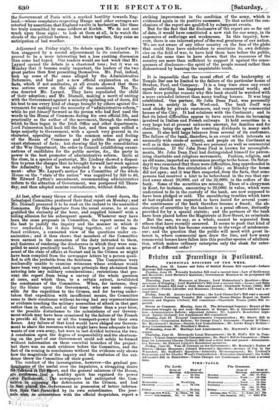Adjourned on Friday night, the debate upon Mr. Layard's mo-
tion staggered by a second adjournment to its conclusion. It proved to be a more interesting but a less exeiting discussion than some had hoped. Our readers would see last week that Mr. Layard opened the debate in a chastened tone ; but it was on Monday that it became really important, the leaders of the two great parties then first presenting themselves. Mr. Peel, indeed, took up some of the cases alleged by the Administrative Reformers, and had put a new official explanation on the facts, which if not conclusive, at all events showed that there was serious error on the side of the assailants. The To- ries deserted Mr. Lavard. They have repudiated the child of their adoption; and Mr. Disraeli, making a merit of uniting with the Government against a minority agitating out of doors, did his best to use every kind of charge brought by others against Go- vernment for making out the necessity of "administrative reform," while he put himself forward as the person who had first used the words in the House of Commons during his own official, life, and practically as the author of the movement, through the reforms which he then began in the Irish Office and other departments. Lord Palmerston held back till the last, and then again rallied a large majority to Government, with a speech very general in its character, appealing rather to the common sense and feeling of the ifouse of Commons and the public than giving an exact statement of facts; but showing that by the consolidation of the War Department, the order in Council establishing exami- nations of candidates for the public service, &c., the party in power is the best promoter of administrative reform. Quite at the close, in a species of postscript, Mr. Lindsay showed a disposi- tion to press the charges that he brought forward last week against the Admiralty ; but he was subjected to a double postpone- ment : after Mr. Layard's motion for a Committee of the whole House on the "state of the nation" was negatived by 359 to 46, 'Sir Edward Lytton's amendment, recommending administrative reform to the attention of Government, was postponed till Thurs- day, and then adopted nemine contradicente, without debate.


































 Previous page
Previous page